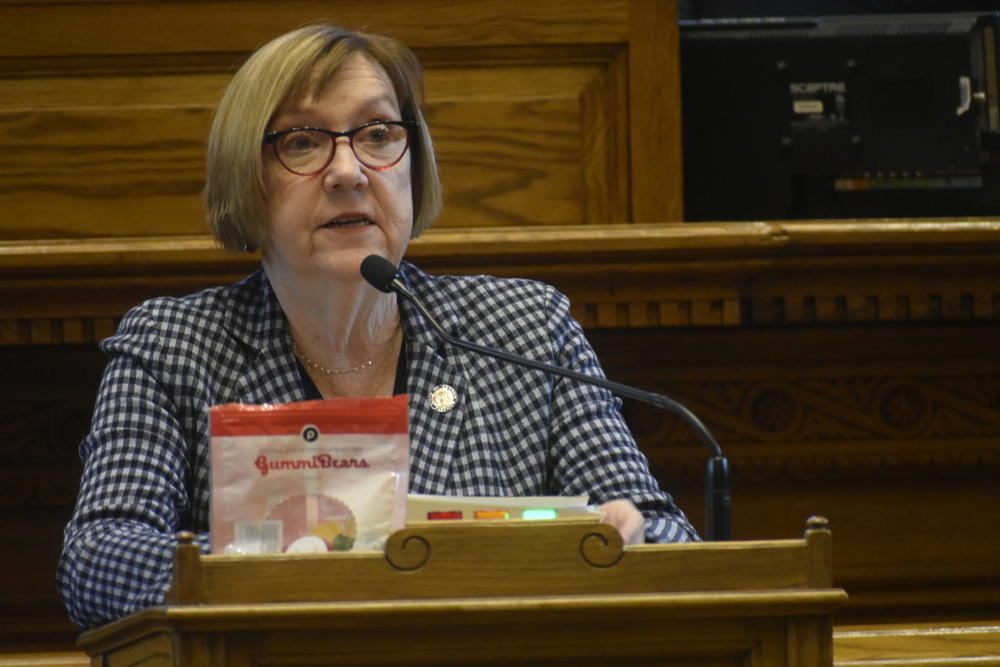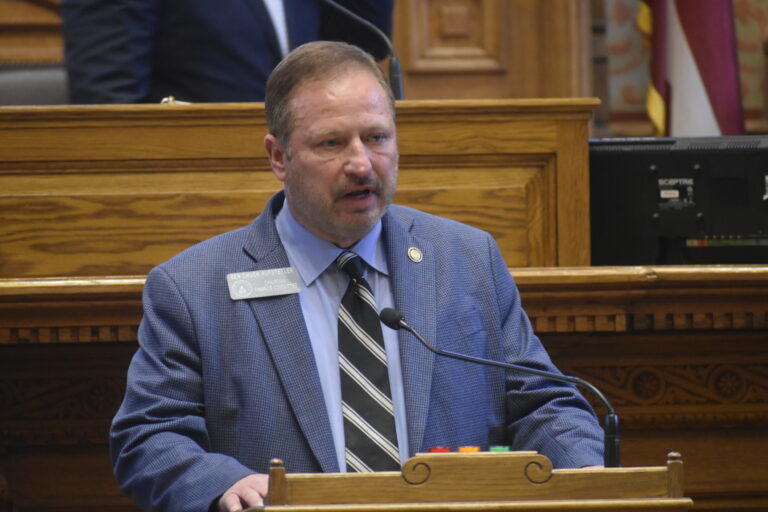
Caption
State Sen. Kay Kirkpatrick brings non-drugged gummy bears to the podium to demonstrate that products containing THC can be packaged to look like kid-friendly candy.
Credit: Ross Williams / Georgia Recorder

State Sen. Kay Kirkpatrick brings non-drugged gummy bears to the podium to demonstrate that products containing THC can be packaged to look like kid-friendly candy.
Georgia senators pressed pause Tuesday on a bill that may have banned the marijuana-adjacent gummies, oils and vape cartridges now on sale at Georgia retailers.
East Cobb Republican Sen. Kay Kirkpatrick said her bill, which was amended and expanded from a previous version that stoked fears of a ban for some, was intended to protect consumers and prevent THC products like Delta-8 from getting into the hands of children.
“This bill is not a ban,” she said. “It’s simply for us to add a process for protecting the public by testing, labeling, and protecting minors.”
Delta-8 THC is similar to Delta-9 THC, the active ingredient in traditional marijuana, which is banned above extremely small amounts in Georgia. It has grown in popularity after a 2018 agriculture bill out of Congress opened a loophole allowing sales of products containing Delta-8 and other THC isomers even in states banning marijuana.
Kirkpatrick’s bill institutes testing requirements for consumable hemp products, sets parameters for acceptable levels of contaminants, spells out licensure requirements for retailers and processors and codifies a ban on sales to people under 21.
“I won’t mention any names, but in this body, I’ve had several people come up to me and tell me that they had chewed a gummy of Delta-8,” said Kirkpatrick, an orthopedic surgeon. “And I’m not going to violate HIPAA, but I will say that people are taken aback by the effects that they get from these products, and in fact, nobody really knows what they’re getting when they have these products. So this for me is a public safety issue. I think we need to be testing and labeling these products and not selling them to children.”
Senators seemed mostly supportive, but Rome Republican Sen. Chuck Hufstetler said the bill did not go far enough to prevent minors from getting these products.

Sen. Chuck Hufstetler
Hufstetler, an anesthesiology assistant, said he was called by a worried constituent whose son came home high on Delta-8.
“When they’re handing these out in candies and children and teenagers are eating candy, that’s why we had a lot of calls to the poison control line, ER visits and stuff like that from people who were taking a lot more than they should have. This bill, by including Delta-8 in there, is the most important part, to me, of the bill.”
The Georgia Poison Center reported 191 calls related to synthetic THC since 2018, with 14 last year. Of those, 53 were in response to people 17 and younger and 130 were for adults.
The center reported 2,251 calls coded as THC during the same time, with 801 last year. Of those, 1,238 were related to minors and 932 were related to adults.
The center notes that their numbers only reflect what was reported to them, and it is not mandatory to report all poisonings.
Hufstetler offered an amendment that he said brought rules for Delta-8 in line with those for Delta-9
Lawmakers approved the amendment 32-23 and started a vote on the bill.
During the vote, Sandy Springs Democratic Sen. Josh McLaurin rose for a question.
“Is it not true that as currently constituted post-amendment, this bill now bans Delta-8?” he asked, eliciting sounds of surprise from other senators.
The bill passed 29-26, but senators immediately called for a vote to reconsider. That passed 28-27, temporarily tabling the bill.
Speaking after the vote, McLaurin said he and many other Democrats supported the bill before Hufstetler’s amendment.
“If there’s a clean version of that bill — no pun intended — that can go through, I think Democrats would be broadly supportive of it,” he said. “What we saw was an attempt at the last minute by one member of the majority caucus to basically ban Delta-8. Now, there was a dispute on the floor about whether that’s what the amendment actually did, but I think the Republican caucus needs to circle up and figure out exactly what it wants to do.”
The bill could be taken up again as early as Wednesday. McLaurin said he views the motion to reconsider as a sign the Republicans will give it due consideration.
“I think that there were some Republicans who voted for reconsideration precisely because they wanted the debate on this to get clarified,” he said. “They wanted to slow the process down. And even if they end up voting with their colleagues, ultimately, in the future, it was important to them to get this right.”
This story comes to GPB through a reporting partnership with Georgia Recorder.
Georgia Health Initiative is a non-partisan, private foundation advancing innovative ideas to help improve the health of Georgians. Learn more at georgiahealthinitiative.org